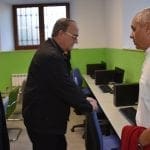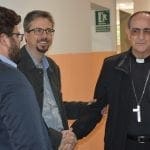For the past two and a half years we have been working and dreaming about ways to respond to the felt needs of vulnerable persons living in Salamanca and afflicted with various forms of mental illness.
How did this initiative arise?
Three Provinces of the Congregation of the Mission in Spain became involved in a restructuring and reorganizing process that resulted in reconfiguration. This process not only resulted in organizational and external changes but also resulted in internal changes (living the charism and significant presence among the poor).
One of the fruits of this process of reconfiguration was the creation of a new Pastoral Plan for Evangelization which concretized our pastoral priority, namely, a clear and expressed preference for those persons who are poor.
Therefore, it was proposed that the Diocesan Office of Cáritas and the Congregation of the Mission engage in a joint project that would respond to the needs of the most poor. The Congregation offered space for this project in their house in Santa Marta de Tormes.
Why become involved with this project
Through a process of reflection, Caritas concluded that there was a need that was not being adequately met by society. In all the various areas where Caritas is ministering, there are people afflicted with mental illness and yet this problem is not being adequately addressed. No resources are in place to respond to this situation.
We are speaking about people with mental health problems who have a certain autonomy but are nonetheless in a situation of social exclusion. This vulnerable situation (which supposes mental illness), when combined with the situation of social exclusion, prevents people from active participation in society and often leads to people being admitted into psychiatric centers, being imprisoned, and then having to rely on some form of state assistance.
How to carry through with this project?
Cáritas and the Congregation of the Mission continued to meet together and visited various mental health facilities. This process brought to light the fact that the best treatment model was assertive community treatment.
Integrating mentally ill people into the life of the community supposes that they will have the necessary support. That reality is highlighted in numerous studies and should provide a direction when considering strategies for mental health services. Such, however, is not always the reality. Assistance for people with severe mental health problems seems so often to be at a stand-still. Mental health policies tend to prioritize neurotic disorders and as a result community care for the seriously mentally ill in our country requires new tools and new approaches that create a dynamic process of care.
Assertive Community Treatment, developed by Leonard Stein and Mary Ann Test in Wisconsin (USA), is a way of structuring assistance to people with serious mental illness that focuses on the social environment in which the patients find themselves. Home interventions are the cornerstone of this process which attempts to integrate various elements (pharmacological, psychotherapeutic, social, family, work).
What do we hope to achieve?
- To offer homeless and mentally ill persons a place where they are supported, where they can restructure their lives and live with dignity.
- Through a high quality process of technical and human accompaniment, to promote the personal and social development of those being served, to support them in the development of their autonomy and to provide them with access to their rights and to basic social services.
- To connect the people served with other health and social centers and to provide them with access to alternative residential and occupational possibilities that are in accord with their needs and interests.
- To sensitize people to the situation of these homeless people who are also afflicted with metal illness (the general pubic, public entities and social entities) with the hope of promoting equal opportunity for these homeless individuals.
What do we want to do?
After our visits and after some time of reflection on the assertive community model, we felt that it would be best to offer three types of services:
Day Center: psycho-social support and complementary services that would cover people’s basic needs. This would provide people with time for rehabilitation, an opportunity to network with other people, social and cultural participation. People with mental illness are often not able to work and so it is necessary look for ways in which these individuals can spend their time in some useful manner. Some of the planned activities might, however, have a focus on work. Each person, nevertheless, should be free to decide which activities meet his/her needs and/or interests. This resource should also be open to people with mental illness but who already are supported by their family and/or some other organization.
Insertion houses: this option best enables people to be reinserted into society. Here we refer to houses shared by several people, others for one individuals or for couples with minor children.
Mini-residence: even though insertion houses are the best option, there are several reasons that also make this idea a viable option: [1] there are mentally ill persons who simply cannot like as autonomous individuals and [2] there are people who because of their situation of social exclusion need a longer period of time to create bonds with other and acquire those skills which will enable them to live as autonomous persons. In all of these situations we will offer temporary housing where we will accompany individuals and provide them with psycho-social support and skill training.
With whom do we want to serve?
From the beginning, both the Congregation of the Mission and Cáritas were clear about the fact that they wanted to engage in this project together. On a civic and social level, networks were created. On the level of intervention, we saw a need to work together with other groups and to collaborate with other associations which are involved in this area of mental health. On an ecclesial level, collaboration and communion are a sign of God’s presence in the midst of the world. We want this to be an inter-congregational project. At a time when communities and congregations are closing houses and leaving various ministries, collaboration together in a project on behalf of the poor becomes a prophetic sign to the world and to ourselves. On a diocesan level, this project should be seen as the fruit of the Spirit and as a concrete manifestation of the God of mercy.
As of today, eight institutions have committed themselves to this project: Cáritas Salamanca, the Congregation of the Mission, the Diocese of Salamanca, the Servants of the Sacred Heart of Jesus, the Sisters of Our Lady of Consolation, the Sacred Heart Sisters, the Daughters of Jesus, the parish of the Miracle of Saint Joseph.
What was our starting point?
The best strategy seemed to be one that could be taken up by all the various entities involved. Thus we would have something concrete that we could show to other public and private entities and could then request that certain demands be met.¡
In this sense the idea of a day center appeared to be the most adequate manner in which to initiate this project. Such a center would also allow us to offer the clients useful ways to occupy their time, and we could also offer these men and women psycho-social support and stabilize their medical treatment. This would also enable us to initiate such a process with people living on the streets of our city. At the same time, networks in the area of mental health could be established and strengthened.
This process was begun on September 27, 2017 when the first Day Center was established. This seemed to be a very appropriate day on which to initiate this project (especially since we were still celebrating the 400th anniversary of our charism). Thus we continue to accompany these men and women who have some form of mental illness and who experience exclusion from present-day society.
By: Francisco Berbegal Vázquez, CM
Translated: Charles T. Plock, CM, Eastern Province, USA
Source: https://cmglobal.org/













0 Comments